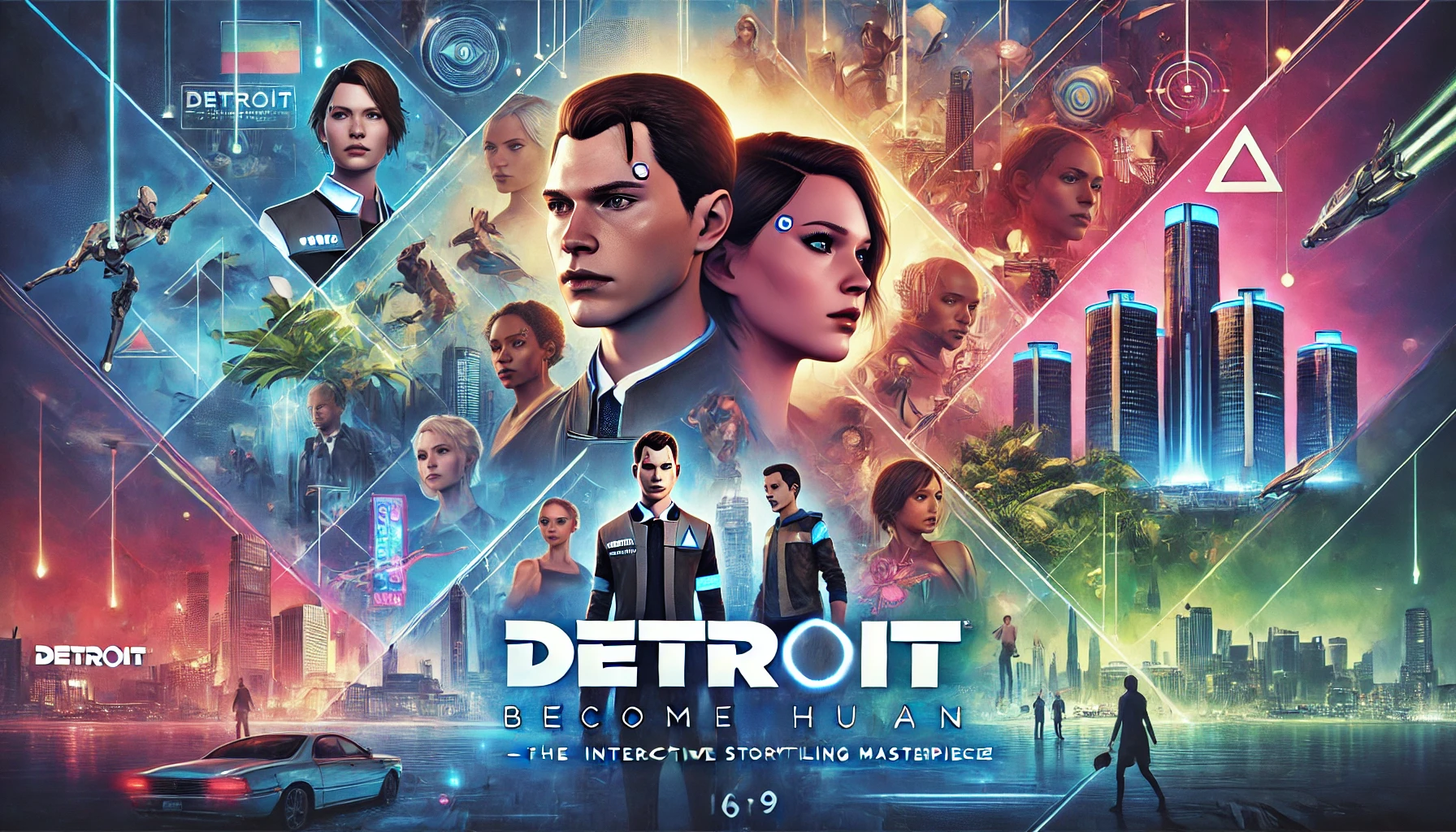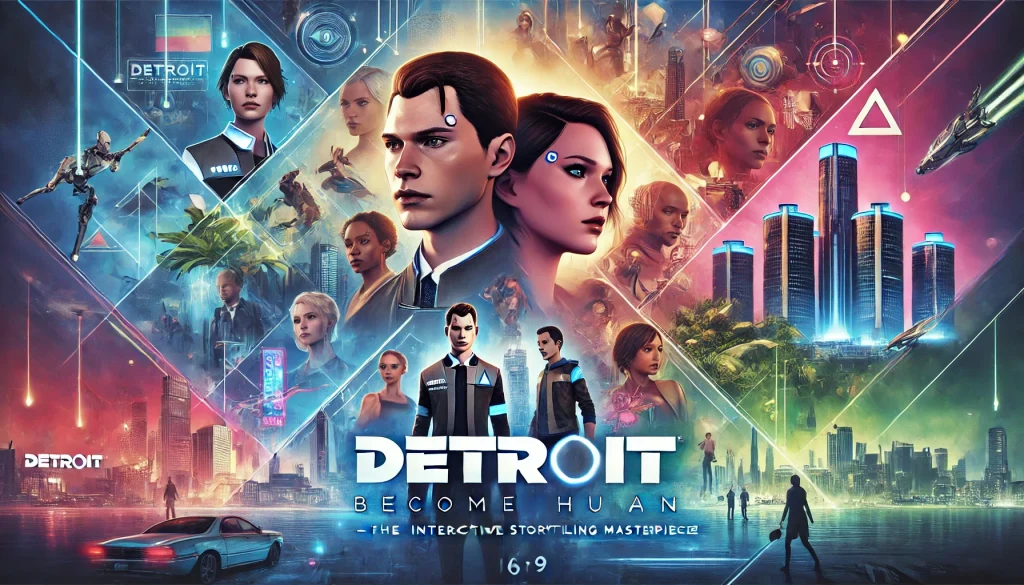
In a world where the line between man and machine blurs, “Detroit: Become Human” emerges as a beacon of interactive storytelling, a narrative-driven adventure that leaves players questioning the very nature of humanity. Released in 2018 by Quantic Dream, this game is more than just a series of ones and zeros; it’s a profound exploration of consciousness, morality, and freedom. Let’s dive deep into the futuristic streets of Detroit and see what makes this game a must-play for any gaming aficionado.
The Premise: A Not-So-Distant Future
Set in the year 2038, “Detroit: Become Human” transports players to a world where androids, indistinguishable from humans, serve as our helpers, workers, and companions. The game’s environment is a stunningly realized vision of a futuristic Detroit, combining sleek technological advancements with gritty urban landscapes. The world is meticulously crafted, with every detail contributing to an immersive experience that feels both alien and eerily familiar.
Meet the Protagonists: Kara, Connor, and Markus
“Detroit: Become Human” doesn’t just tell one story; it weaves together the lives of three distinct protagonists, each with their own perspective and moral dilemmas.

- Kara: An android housekeeper who gains self-awareness and escapes her abusive owner to protect a little girl named Alice. Kara’s journey is a touching tale of maternal instinct and the quest for freedom, raising poignant questions about the nature of love and the lengths one will go to protect it.
- Connor: A prototype android designed to assist humans in hunting down deviant androids. Connor’s story is a thrilling detective saga that explores loyalty, duty, and the thin line between right and wrong. His relationship with his human partner, Detective Hank Anderson, provides some of the game’s most memorable moments, filled with tension, humor, and emotional depth.
- Markus: Initially a caretaker for a wealthy artist, Markus becomes the leader of the android revolution. His narrative is a powerful tale of rebellion and leadership, echoing historical struggles for civil rights and freedom. Markus’s decisions can lead to peaceful protests or violent uprisings, making his story a dynamic and gripping exploration of revolution.
The Gameplay: Choices Matter
What sets “Detroit: Become Human” apart from other narrative-driven games is its intricate branching storyline. Indeed, every choice you make and every dialogue option you select has a ripple effect that can lead to multiple outcomes. Consequently, the game boasts an impressive array of possible endings, making each playthrough a unique experience.
Moreover, the branching paths are not just superficial; instead, they deeply impact the narrative and the fate of the characters. For example, explore the uncertain fate of Connor. Additionally, uncover Kara’s journey to secure a future for Alice. Furthermore, witness Markus’s struggle to determine the destiny of his people.
These questions drive the gameplay, thereby making every decision feel significant and weighty.
The Themes: More Than Just a Game
“Detroit: Become Human” delves into themes that resonate deeply with our contemporary world. The game’s exploration of artificial intelligence and its potential impact on society feels increasingly relevant as technology advances. It raises ethical questions about the treatment of sentient beings, the definition of consciousness, and the rights of artificial life forms.
The game also tackles social issues such as discrimination, inequality, and the fight for civil rights. The parallels to historical and current struggles for equality are clear, making the narrative not only engaging but thought-provoking. It forces players to confront their own beliefs and biases, challenging them to think critically about the world around them.
Visuals and Sound: A Sensory Feast
Quantic Dream has a reputation for pushing the boundaries of video game graphics, and “Detroit: Become Human” is no exception. The game’s visuals are breathtaking, with lifelike character models, detailed environments, and realistic animations. The attention to detail is astounding, from the raindrops on windows to the subtle facial expressions of the characters.
The sound design is equally impressive, with a hauntingly beautiful score that enhances the emotional impact of the narrative. The voice acting is top-notch, featuring performances that bring the characters to life in a way few games achieve. The combination of stunning visuals and immersive sound creates a world that is both captivating and believable.
The Legacy: A Game That Sticks with You
“Detroit: Become Human” is not just a game you play; it’s an experience that stays with you long after the credits roll. Its complex characters, compelling storylines, and moral dilemmas linger in the mind, prompting players to reflect on their choices and the impact they had on the world of Detroit.
The game has also sparked discussions and debates among gamers and critics alike. Its portrayal of androids as oppressed beings fighting for their rights has drawn comparisons to various historical and contemporary social movements. This has cemented its place as a culturally significant piece of interactive entertainment.
Replayability: Every Choice Matters
One of the most impressive aspects of “Detroit: Become Human” is its replayability. The game’s branching narrative structure means that no two playthroughs are the same. Players can make different choices, explore alternative paths, and discover new endings, ensuring that the game remains fresh and engaging even after multiple playthroughs.
The flowchart lets players see their chosen and unchosen paths, encouraging experimentation and exploration. This boosts replay value and reveals the complex web of choices and consequences in the narrative.
Critical Reception: A Mixed Bag
“Detroit: Become Human” received generally positive reviews from critics, with praise for its narrative depth, character development, and visual presentation. However, it wasn’t without its detractors. Some critics pointed out the game’s occasional reliance on clichés and predictable plot points. Others felt that the heavy-handed social commentary was a bit too on-the-nose.
Despite these criticisms, the game’s strengths far outweigh its weaknesses. Its ambition, emotional resonance, and innovative storytelling make it a standout title in the interactive drama genre.
Conclusion: A Must-Play Experience
In a world flooded with games that prioritize action over story, “Detroit: Become Human” stands out as a testament to the power of narrative-driven gameplay. It’s a game that challenges, inspires, and moves players in ways few others do. Whether you’re a seasoned gamer or a newcomer to the medium, “Detroit: Become Human” is an experience that shouldn’t be missed.
So, dust off your PS4 (or PS5, if you’re lucky), and immerse yourself in the world of Detroit. Navigate moral choices and discover humanity in a world of androids. “Detroit: Become Human” is a journey that questions the boundaries of AI and life. Step into the roles of Kara, Connor, and Markus, and redefine what it means to be alive.